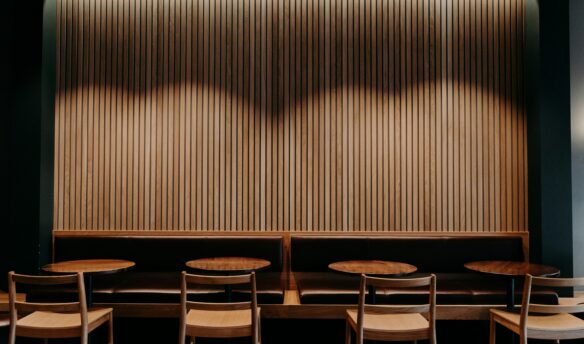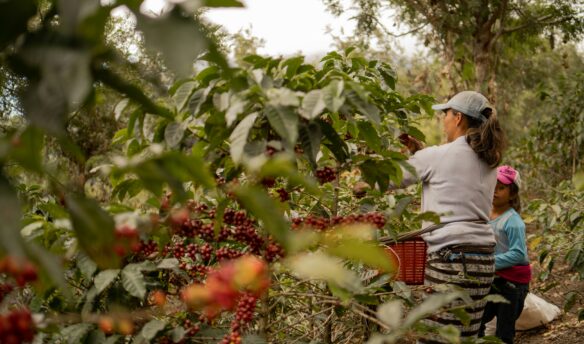Which roast level has more caffeine? Scientists say 🤷♂️. Plus, coffee prices break records, and researchers use DNA to investigate how coffee diseases spread.
‘Coffee Rises to Record After Trader Cuts Brazil Crop Outlook’ – via Bloomberg
Coffee prices have reached their highest point on record after surging by more than 80% this year. The cost of coffee futures on the commodity C market spiked again after weeks of sustained highs not seen since the late 1970s.
The C market reached $3.48 per pound last week, higher than the previous record of $3.35 set in 1977—although it’s worth noting that $3.35 in 1977 would be $17.45 today. The C-market price went up after green coffee trading company Volcafe announced they anticipated that Brazil would produce less coffee than initially expected. Volcafe forecast that Brazil will produce 34.4 million bags of arabica during the 2025-26 season, down around 11 million from its September estimate.
Because Brazil is the largest producer of coffee, fluctuations in its coffee production can impact markets globally.
But Brazil’s coffee harvest isn’t the only thing influencing price. Demand for coffee has risen dramatically, especially in emerging markets like China. At the same time, global stockpiles of coffee have fallen due to several years of bad weather and poor harvests in Brazil, Vietnam, and others.
“Global coffee production is on track to fall short of demand by 8.5 million bags in the 2025-26 season, marking an unprecedented fifth year of deficits,” Megan Durisin and Celia Bergin wrote for Bloomberg.
CNC reporter Sam Meredith talked to experts who say there’s a good chance that prices will remain high for the foreseeable future. “History suggests that coffee prices will only ease back as and when supply improves and stocks are replenished,” said economist David Oxley. “Crucially, this is a process that can take years, not months.”
‘New Study Reveals Genetic Mechanisms Behind Wilt Disease’ – via Global Coffee Report
Coffee wilt, a disease that kills coffee plants by interfering with the plant’s ability to get water, has periodically decimated coffee production in Africa since the 1920s. Despite its impact, not much is known about its genetic makeup or how it spreads.
However, that’s about to change. A new study from Imperial College London, in collaboration with the University of Oxford and the agricultural nonprofit CABI, has shed light on how the disease evolves and adapts to new hosts—something researchers hope will help manage future outbreaks.
Coffee wilt disease (CWD) is caused by a soil-borne fungal pathogen known as Fusarium xylarioides, which invades through the roots and cuts off water uptake, completely killing the plant. It affects both commercial and wild-growing coffee species, and while endemic to Africa, researchers worry that the disease could spread further.
For this new study, published in PLOS Biology, scientists investigated the genomes of 13 historical strains of F. xylarioides to identify the evolutionary process behind CWD’s spread and periodic outbreaks. “We found that F. xylarioides comprised at least four distinct lineages: one host-specific to arabica, one to robusta and two historic lineages isolated from various coffee species,” lead author Dr. Lily Peck said in a press release. These distinct lineages helped CWD to infect different coffee species.
The study also found that F. xylarioides borrowed segments of DNA from another fungal pathogen, F. oxysporum, which enabled it to adapt and infect new hosts. This process, called horizontal gene transfer, likely helped CWD spread to new parts of Africa.
There hasn’t been a major outbreak of CWD in decades. However, in a recent paper, Peck noted that because it emerges sporadically, “CWD receives little attention and its importance is downplayed or simply ignored. Memories are short and knowledge of past outbreaks fragmentary.”
CWD can cause significant damage to farms—by the late 1950s, it had reduced coffee production by 50% in Guinea, and is a prime cause for why farmers in the area had to give up coffee farming altogether.
The authors hope their research can help develop new treatments or breed resistant varieties. “By understanding how these fungal pathogens have evolved in the past when we’ve tried to control them, we can try to manage outbreaks of new pathogens in the future,” said co-author Professor Timothy Barraclough.
‘Scientists Figured Out the Optimal Cup of Coffee’ – via Popular Science
Which contains more caffeine: light- or dark-roasted coffee?
It’s an age-old question that many coffee folks think they know the answer to. But after hearing many different theories over the years without any hard data, researchers from Berry College and Drexel University decided to try to find out.
They used carefully controlled parameters to answer the question once and for all. The result? Well, it depends.
For the study, published in Scientific Reports, the researchers used two Ethiopian coffees, one natural and one washed, and roasted them to five different levels. Afterward, they ground and sifted, then brewed each sample using an Aeropress. They then used high-performance liquid chromatography and other tools to analyze the results.
What they found is that reducing caffeine content to roast level is too simplistic. “Attributes such as caffeine content are the result of intricate relationships between how coffee is roasted, and how well its organic compounds can dissolve into water,” Andrew Paul reported for Popular Science.
“Under identical brewing conditions, caffeine concentrations in brewed samples were generally lower for dark roasts than light and medium roasts,” the authors wrote. “However, at identical extraction yields, dark roasts generally exhibited higher caffeine concentrations than lighter roasted coffees.”
Glad we cleared that up.
More News
‘Here’s Everyone Moving On From The US Coffee Championships Regional Event In Kansas City’ – via Sprudge
‘Starbucks Enters 88th Market Globally With First Honduras Outlet’ – via World Coffee Portal
‘Korean ‘Coffee Mix’ Enjoys Rare Uptick in Sales’ – via The Korea Herald
‘‘American Dad!’ Partners With Green Day’s Punk Bunny Coffee For Limited-Edition Collaboration’ – via Forbes
‘Report: Climate Change Adaptation Plans Are Working for Coffee Producers’ – via Daily Coffee News
‘Dutch Trader Sucden Coffee Surrenders $670K+ After ICE Allegations’ – via Daily Coffee News
The Week in Coffee Unionizing
In Chicago, La Colombe fired five workers in what the union alleges is retaliation for organizing.
After an organizing campaign that began two years earlier, four out of five Chicago locations of the specialty chain voted to ratify a union contract in October. “Given the proximity to the ratification of the contract, this feels retaliatory, it feels intimidating and it starts the relationship between this brand new bargaining [unit], this brand new union within this company on a really antagonistic foot,” an anonymous barista told Leigh Giangreco of Eater Chicago.
The fired workers said they were subject to “policy review” meetings in which they were shown footage of themselves handing out free drip coffee to regulars, locals, and unhoused individuals. One worker told Giangreco that before La Colombe was acquired by Chobani, handing out free drinks was acceptable as a way to build community.
La Colombe wouldn’t comment on specifics but told Eater “we can say that we take our [company’s] values and policies including our Standards of Conduct seriously, and enforce them equally, holding all employees across all aspects of the company to the same established standards.”
One of the fired baristas alleged that workers at their location were singled out because it was one of the cafes central to union organizing. “I think they specifically targeted our cafe because the people at our location were some of the more militant and more senior people,” the barista said. “Our cafe was seen as a problem more so than the others.”
Meanwhile, workers at Fairgrounds Coffee in Milwaukee, Wisconsin, are unionizing with the help of the Milwaukee Area Service and Hospitality Workers Organization (MASH).
Workers demanded voluntary recognition from management; instead, the company hired labor attorneys and filed to hold an election with the National Labor Relations Board (NLRB). “Workers across the hospitality industry recognize that the only way to ensure a meaningful voice and a seat at the table on the decisions that matter to them is with a union and a contract,” said MASH president Peter Rickman.
Beyond the Headlines
‘Behind the Headlines: Is Starbucks Writing Names on Cups Again Sweet or Silly?’ by Amber Gibson
‘Column: The Shifting Seasons of Coffee Shipments’ by Chris Kornman










